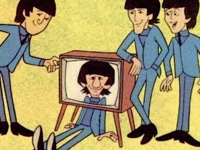Ringo Starr’s Y Not, released on January 12, 2010, found its centerpoint with “Walk With You,” a duet with former Beatles bandmate Paul McCartney.
There, the friendly bravado of Ringo’s best early records melted into a sadly appropriate melancholy — and not the put-on, aw-shucks kind so familiar from his youthful performances as a member of the Fab Four. Instead, “Walk With You” features a darkly mature chorus unlike any he’s put out. Paul McCartney’s vocal works in counterpoint, taking the high road, while Ringo Starr intertwines beside and underneath.
Elsewhere, Y-Not can scarcely compete. That said, it often sounds like one of Ringo’s All-Starr tours. Nobody is trying too hard, and the record — the first Ringo Starr had produced himself — is better, warmer, for it.
There are guest shots from brother-in-law Joe Walsh (on the effortlessly affable opener “Fill in the Blanks”), Heartbreaker Benmont Tench, ex-Eurythmic Dave Stewart (on “The Other Side of Liverpool,” co-writer Starr’s most frankly autobiographical take on his youth), Ben Harper, Edgar Winter, Richard Marx and, on the final cut, neo-soul stylist Joss Stone (the barrelhouse fun of “Who’s Your Daddy?”).
Today, it all falls in line behind the Paul McCartney duet. Paul had initially been invited to add the bass part for the sometimes perfunctory “Peace Dream” (a collaboration between Starr and legendary composer and arranger Van Dyke Parks), but was struck by “Walk With You,” instead.
McCartney’s vocal — a quick breath after Ringo’s, it’s like an echoing afterthought — recalls their fresh, offbeat Abbey Road constructions. Only there are these soft edges associated with age, and with loss. “He makes it bigger and he makes it fuller,” Starr said back then. “It makes the song like a conversation between us, and that was Paul’s idea to do his part one beat behind me. That’s why he’s a genius.”
On first blush, there’s not much to the lyric: When I walk with you, when I talk with you, everything will be fine. But you’re reminded of the history here, and the repeated words begin to unravel on themselves. Even as proud survivors, there is always an inevitable devastation for those left behind. It couldn’t have come easy.
Singing without the other half of the Beatles, Ringo and Paul tap into the deep well of emotion associated with those who fortunately and also, in a way, unfortunately remain. They are at once together, but alone. It remains one of the most remarkable moments not just on this Ringo Starr recording, but on any of them.
- How Deep Cuts on ‘Music From Big Pink’ Underscore the Band’s Triumph - July 31, 2023
- How ‘Islands’ Signaled the Sad End of the Band’s Five-Man Edition - March 15, 2022
- The Band’s ‘Christmas Must Be Tonight’ Remains an Unjustly Overlooked Holiday Classic - December 25, 2016




